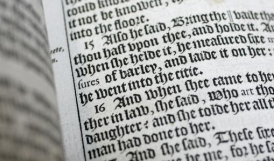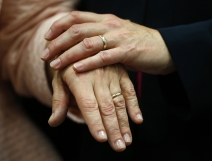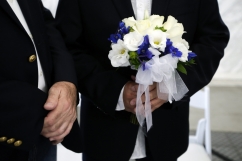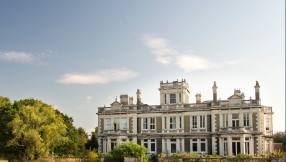Several years ago I asked a key figure in the Baptist Union of Great Britain if the question of same-sex partnerships – no one had thought of marriage then – would ever be discussed by the Union. "Over my dead body," he responded cheerfully, having accurately foreseen the world of pain which any such debate would create.
Now, the Government action in driving through same-sex marriage legislation has forced the question up its agenda, and a statement at the Union's annual Assembly outlined, in highly traditionalist language, its current thinking:
"We affirm the traditionally accepted Biblical understanding of Christian marriage, as a union between a man and a woman, as the continuing foundation of belief in our Baptist churches."
However, it also appeared to allow accredited Baptist ministers to conduct a same-sex ceremony, should they wish to. This was previously understood to be forbidden, but now: "Upholding the liberty of a local church to determine its own mind on this matter, in accordance with our Declaration of Principle," the statement read, "we also recognise the freedom of a minister to respond to the wishes of their church, where their conscience permits, without breach of disciplinary guidelines." In practice, the Union's ability – and its willingness – to discipline its ministers over this has never been entirely clear, as witnessed by the fact that Steve Chalke was able to conduct a same-sex blessing in 2012 without apparent consequences.
This was sufficient for Premier Radio to run a story headlined "Baptist Union to allow gay marriage ceremonies". A lengthy and startlingly sharp rebuttal from the Union followed almost immediately, including words like "misleading", "inaccuracies" and "misrepresentation". The statement was subsequently removed from the Union's website and Premier – which arguably had a bit more of a case than the Union were prepared to allow – issued a revised and rather more nuanced story.
The Union-Premier spat is one thing, though it is perhaps worth pointing out that before a radical downsizing of the Union's communications department, the potential for misunderstandings in such a sensitive area would probably have been spotted in advance. However, the really interesting thing isn't what its statement tells us about British Baptist views on same-sex marriage, but what it says about Christian unity.
The Baptist Union is an overwhelmingly evangelical and theologically conservative denomination, but it hasn't chosen to make a policy statement on same-sex marriage (it could have done this by allowing or forcing a vote).
The Union is just that, a Union. It has no central authority as Anglicans or Methodists do, and respect for theological differences is essential to its being.
So, in keeping with its structure, it made a mature and thoughtful call for mutual respect. It expressed the position of the vast majority of its churches (that is, the traditional understanding of marriage as between a man and a woman) but declined to stigmatise those who disagree.
Of course, there are unresolved tensions in all this. Ministers are in principle allowed to conduct a same-sex marriage for someone else, but would be guilty of "conduct unbecoming" if they did it themselves. (The absurd situation might arise where a Baptist minister wanted to marry someone of the same gender in a service conducted by another Baptist minister; one would be disciplined, the other not. Seriously, it's bound to happen.)
At the moment the contradiction lies in the fact that ministers are accountable to two parties – the local church they lead, and the wider Union. The Union requires behaviour of its ministers that their churches may not. That's a very difficult knot to unravel, but the direction of the Union's travel seems to be in the direction of returning ultimate accountability to the local church.
There are, of course, dangers in this course, not least in the questions it raises about the point of a Baptist denomination at all. Nevertheless: a key Baptist Declaration of Principle is that "our Lord and Saviour Jesus Christ, God manifest in the flesh, is the sole and absolute authority in all matters pertaining to faith and practice, as revealed in the Holy Scriptures, and that each church has liberty, under the guidance of the Holy Spirit, to interpret and administer his laws". So what is being done at present, or not done, about same-sex marriage, is arguably very principled and very Baptist. We do not all agree, but we trust those with whom we disagree and we remain sisters and brothers.
Same-sex marriage has split Christian opinion. In many ways it has shown us at our worst. We have let it stand for everything that we dislike about an increasingly secular and libertarian society and made it the litmus test of heresy and orthodoxy – or at least, of evangelicalism and non-evangelicalism. Far too many of us, if we're honest, can't really claim to have made every effort to "keep the unity of the Spirit in the bonds of peace" (Ephesians 4.3). Sometimes it looks more as though we're spoiling for a fight.
I hope the churches in my Baptist denomination live up to the tremendous responsibility they've been given. What God has joined together, let no one separate.
Rev Mark Woods is former editor of The Baptist Times.




















